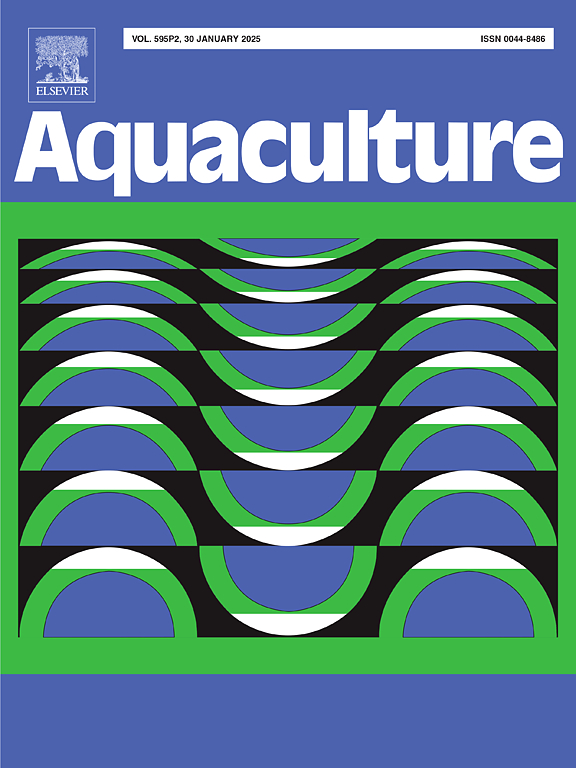一株海产芽孢杆菌的分离、鉴定及其对schlegelii饲料添加剂的摄食作用
IF 3.9
1区 农林科学
Q1 FISHERIES
引用次数: 0
摘要
工业化规模水产养殖的集约化发展导致了对抗菌素的过度依赖,引发了全球对残留污染和抗菌素耐药性扩散的担忧。由于其已证实的益生菌作用,海洋来源的芽孢杆菌已成为水产养殖系统中传统抗生素的有希望的替代品。从沿海沉积物样品中分离出一株海洋来源的芽孢杆菌M1菌株,显示出强大的弧菌抑制活性。综合评价表明,M1表现出良好的环境适应性和稳定性,同时保持对常用抗生素的敏感性。为探索M1在水产养殖中的潜在应用,本研究开展了动物试验,从生长性能、消化酶活性、肠道健康和免疫系统反应等方面评价了其对施勒氏sebases schlegelii的影响。结果显示,口服M1显著提高了施莱格氏沙门氏菌的生长速度、饲料效率和肠道消化酶活性(p <;0.05)。此外,肠道结构改善,免疫和抗氧化酶活性提高。值得注意的是,在饲料中添加M1后,schlegelii各器官中IL-2和IFN-γ的水平显著升高(p <;0.05)。相反,IL-1β、TNF-α和IL-10水平降低(p <;0.05)。此外,对哈维氏弧菌感染的抗性增强,保护率高达73.33%。这些结果表明,嗜酸梭菌M1可以调节施莱格氏梭菌的免疫功能,从而改善其生长性能和整体健康状况。因此,B. inaquosorum M1被认为是一种潜在的水产养殖饲料添加剂和抗生素替代品。本文章由计算机程序翻译,如有差异,请以英文原文为准。
Isolation and characterization of a marine strain: Bacillus inaquosorum, and its feeding effects on Sebastes schlegelii as feed additive
The intensive development of industrial-scale aquaculture has led to overreliance on antimicrobial agents, raising global concerns about residual contamination and the proliferation of antimicrobial resistance. Marine-derived Bacillus spp., due to their proven probiotic effects, have emerged as a promising alternative to traditional antibiotics in aquaculture systems. A marine-derived Bacillus inaquosorum strain M1 demonstrating potent Vibrio-inhibitory activity was isolated from coastal sediment samples. Comprehensive assessments demonstrated that M1 exhibited excellent environmental adaptability and stability while maintaining sensitivity to commonly used antibiotics. To explore the potential applications of M1 in aquaculture, animal trials were conducted to evaluate its effects on Sebastes schlegelii, including growth performance, activity of digestive enzymes, intestinal health, and response of the immune system. The results revealed that oral M1 significantly enhanced the growth rate, feed efficiency, and intestinal digestive enzyme activities in S. schlegelii (p < 0.05). Furthermore, improvements in intestinal structure and increased activities of immune and antioxidant enzymes were observed. Notably, levels of IL-2 and IFN-γ in various organs of S. schlegelii were significantly elevated following dietary supplementation of M1 (p < 0.05). Conversely, levels of IL-1β, TNF-α, and IL-10 were reduced (p < 0.05). Additionally, the fish exhibited enhanced resistance to V. harveyi infections, with a protection rate of up to 73.33 %. These findings suggested that B. inaquosorum M1 can modulate the immune function of S. schlegelii, thereby improving their growth performance and overall health status. Consequently, B. inaquosorum M1 is posited as a potential candidate for application as an aquaculture feed additive and a promising alternative to antibiotics.
求助全文
通过发布文献求助,成功后即可免费获取论文全文。
去求助
来源期刊

Aquaculture
农林科学-海洋与淡水生物学
CiteScore
8.60
自引率
17.80%
发文量
1246
审稿时长
56 days
期刊介绍:
Aquaculture is an international journal for the exploration, improvement and management of all freshwater and marine food resources. It publishes novel and innovative research of world-wide interest on farming of aquatic organisms, which includes finfish, mollusks, crustaceans and aquatic plants for human consumption. Research on ornamentals is not a focus of the Journal. Aquaculture only publishes papers with a clear relevance to improving aquaculture practices or a potential application.
 求助内容:
求助内容: 应助结果提醒方式:
应助结果提醒方式:


